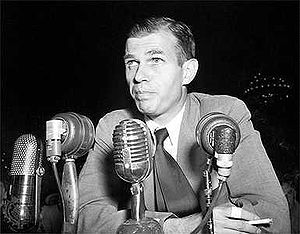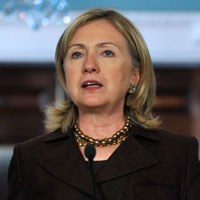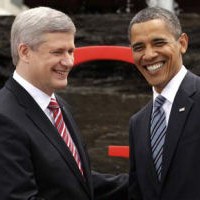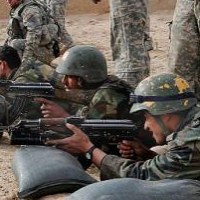![]()
Fri, July 27, 2012 | RubinReports | By Barry Rubin
When Andrew McCarthy drew a parallel between the treatment of State Department official (and Soviet spy) Alger Hiss in the 1940s and Secretary of State Hillary Clinton’s aide Huma Abedin Weiner today it reminded me of an interesting discovery from my own research, as documented in my history of the State Department, Secrets of State. As Andrew McCarthy notes, after Hiss was accused of being a Soviet spy and convicted of perjury, Secretary of State Dean Acheson — a friend and colleague in his law firm of Hiss’s brother — defended the accused spy.
This doesn’t mean that Huma Abedin Weiner — whose father, mother, and brother were very active in the Muslim Brotherhood and who herself worked for Brotherhood front groups — is guilty of any misbehavior. On the other hand, Alger Hiss’s brother, Donald, was a respected lawyer and a partner of Acheson about whom there were also some suspicions. A key influence in Alger’s life were the political views of his wife, Priscilla. And while Huma’s spouse, Anthony Weiner, has certain personal issues being a Muslim Brotherhood person isn’t one of them. On the other hand, though, Alger, unlike Huma — to continue the analogy — was never an official in a Communist front group and she has no shortage of relatives who were deeply involved in the Brotherhood.
Yet the Hiss case does offer us a lot of lessons for today.
After World War Two ended the State Department had to decide how to convert back to peacetime work. It did a thorough security review of 3000 employees to check for security risks and identified 285 people as possible problems. Most of them had either already quit; were forced to resign or encouraged to go elsewhere as soon as possible. A lot of them went to work for the United Nations.
On July 26, 1946, Secretary of State James Byrnes released a detailed report going through these cases. The Truman Administration also fully cooperated with the House of Representatives, which issued its own detailed report on these investigations in March 1948. Remember that there was not enough proof to prosecute anyone and in many cases the information against them was minor and even clearly false, far less than we know for a fact about Abedin Weiner. Having a relative with Communist sympathies was enough to get someone fired though. In the end, about 50 of those who had been investigated but against whom there was no reliable evidence — in some cases just statements by personal enemies — were allowed to remain at junior posts at the State Department.
But in one case, the 1948 House of Representatives’ report said that a certain man was “the greatest security risk the Department has [ever] had.” He wasn’t identified by name but it was noted he resigned on a specific day. It was the date Hiss resigned. Obviously, he was the person being referred to in the report. Every high official in the State Department had to know that Hiss was deeply implicated in espionage.
Many people know the story of Whittaker Chambers and his warning about Hiss to State. What they may not know that by 1945 and certainly by early 1946 both the State Department and the FBI was convinced of Hiss’s guilt. Secretary of State Byrnes was informed. In March 1946, the State Department security staff recommended Hiss should be given a choice between being fired or resigning but also noted that they did not believe they could prove Hiss’s guilt in court. So a Republican with impeccable conservative credentials, the future Secretary of State John Foster Dulles, stepped in and offered Hiss a job as president of the Carnegie Endowment for International Peace. Hiss accepted and resigned.
Hiss’s guilt was thus no secret within the government. One can understand how, lacking proof before Chambers produced pilfered documents, that they might have chosen to remain silent. To defend Hiss publicly, though, was both morally wrong and politically suicidal. Here is a graphic precedent for high-ranking officials knowing there was a real danger and yet loudly denying that any problem existed.
I’m not going to repeat the story of Chambers and Richard Nixon and the “Pumpkin Papers” because you presumably know about this or can easily research it. An intriguing question, though is this: Why is it that the Truman Administration did a good job of rooting out Communists and spies but did not publicly acknowledge this, even when it came under attack from Senator Joe McCarthy and others? Remember that the pro-Communist left hated Truman and ran against him in 1948 under the Progressive Party banner?
Presumably there were two main reasons. First, it did not want to lend credence to the attacks against itself and make the New Deal look bad, a political motive. Second, it could not reveal intelligence sources — including what we now know as the Venona Intercepts of Soviet secret telegrams as well as information from friendly intelligence agencies. In Hiss’s case there was also an element of the aristocracy sticking together. Yet this was a costly decision. At any rate, the lack of acknowledgment of the Truman Administration’s and State Department’s own efforts in this regard has led to some misunderstanding of history as well as adding to the mythology that the problem of Communist penetration was a myth.
One wonders whether we will be saying the same thing in a few decades about radical Islamist penetration of the federal government today. In this case, though, the Obama Administration behaved far worse than did its predecessor. Truman got rid of those with real security problems; Obama is doing nothing. And meanwhile the administration’s Republican enablers are contributing to the danger. Suffice it to say that there is a lot of evidence of multiple suspect individuals in this regard. Go back and read what the superb investigative reporter Patrick Poole has been writing for the last few years to see the extent of this problem.
Let me mention another of the most passionate issues of that earlier era. Did the United States lose China? I do not propose to reexamine the issue in depth but only to make some very specific points. The question in retrospect is whether the United States should have followed an energetic policy of supporting the nationalist forces of Chiang Kai-Shek against the Communists. No one can say whether such a policy would have changed the course of the Chinese Civil War. It was said that certain left-wing experts on China influenced the Truman Administration not to do more. It could well be argued that these experts didn’t have much influence, that no U.S. government would have undertaken such a giant effort at the time, and that such an effort wouldn’t have changed anything.
Incidentally, this also reminds me of a great memo written by a long-forgotten American diplomat who possessed common sense. Around 1946 in response to the idea that Ho Chi Minh wasn’t really a Communist but a nationalist who the United States could win over and moderate by giving him support, the State Department officials wrote something like this: “That argument might possibly be true but it would be a hell of a risk to take!”
As I said, though, I don’t want to enter into those debates.
But if we focus on revolutionary Islamism today we can answer parallel questions more easily. In the Obama Administration’s favor, we could say that it succeeded in Libya in installing a non-Islamist government that prevailed in elections. We can also say that in Tunisia the nature of that society has limited the scope of an Islamist victory and may — or may not — eventually get rid of an Islamist-led coalition there. That’s due to Tunisia, though, not to the White House.
The president’s record on Egypt, Lebanon, the Gaza Strip, Syria, and Turkey, however, is bad. The Obama Administration has promoted the Muslim Brotherhood in Egypt and Syria; pressed Israel to go soft on Hamas in the Gaza Strip (and vastly helped Hamas by its own Egypt policy), and promoted a stealth Islamist regime in Turkey to be its best friend in the Middle East. And here we know that literally hundreds of “experts” inside and outside of government — a far more impressive force than the handful of suspect China experts — have promoted this goal. This record is far clearer than the China question of sixty years ago.
The usual defense is that Obama didn’t have much leverage to prevent these problems from developing. That’s nonsense. He could have worked with the army in Egypt and Turkey as well as doing more to promote the moderate forces there. In Lebanon, the United States abandoned the moderates who were then in power, a problem due partly to George W. Bush and Secretary of State Condoleeza Rice but mainly to Obama. The same can be said of Bush and Rice letting Hamas run in the Palestinian elections even though that violated the Oslo agreement. While it seems like a bad joke it is sadly true that Bush and Rice assumed that Hamas would lose because they depended on the misleading polls by the incumbent Palestinian Authority’s Fatah leadership’s front group. But Obama’s panicked reaction to the Turkish-organized Gaza flotilla — we must do something to ease the pressure on Hamas! — was even more embarrassing.
Think about what’s happening in Syria. How about investigating how pro-Islamist Defense Department official broke U.S. regulations by bringing Syrian Muslim Brotherhood leaders in for meetings a few years ago? There is no bar on U.S. aid — including supplying guns — to the Muslim Brotherhood elements in the opposition. There is no policy favoring help for moderates among the rebels. There is no statement that any opposition group involved in massacring civilians because they are Alawites or Christians will never again get any American political or military assistance! How about investigating the terms of U.S. aid to radical anti-American forces in the opposition and the Obama Administration’s help in creating a Brotherhood-dominated Syrian National Council?
As for Turkey, we know, thanks to Wikileaks, that the State Department reporting warned repeatedly about the Islamist and anti-American intentions of the Turkish regime. That one is completely Obama’s fault. He has repeatedly made clear that a repressive Turkish government that has broken the armed forces, is subverting the courts, and has trampled on the freedom of expression is his ideal type of regime, an example for other Muslim-majority countries!



 RSS
RSS











Latest Comments
Hello Mike, Thank you for your positive feedback to the article. I felt there wasn’t too much critical analysis of ...
Thanks for this considered and well constructed article. A follow up article on the manner in which the editorial contro...
THE CLUELESSNESS OF CLAIMING THAT OBAMA'S MIDDLE EAST POLICIES WERE A FAILURE CANNOT BE FURTHER FROM THE TRUTH, WHAT THE...
As long as Obama is the president of the usa do not trust the us government......
Thank you for an good read....